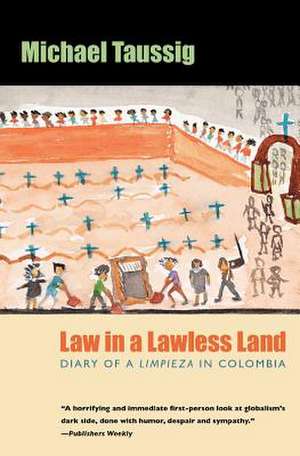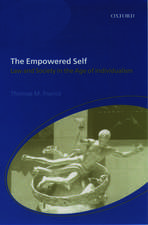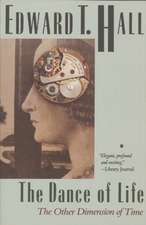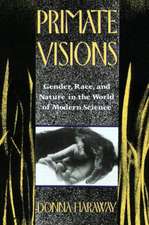Law in a Lawless Land: Diary of a Limpieza in Colombia
Autor Michael Taussigen Limba Engleză Paperback – 15 noi 2005
A modern nation in a state of total disorder, Colombia is an international flashpoint—wracked by more than half a century of civil war, political conflict, and drug-trade related violence—despite a multibillion dollar American commitment that makes it the third-largest recipient of U.S. foreign aid.
Law in a Lawless Land offers a rare and penetrating insight into the nature of Colombia's present peril. In a nuanced account of the human consequences of a disintegrating state, anthropologist Michael Taussig chronicles two weeks in a small town in Colombia's Cauca Valley taken over by paramilitaries that brazenly assassinate adolescent gang members. Armed with automatic weapons and computer-generated lists of names and photographs, the paramilitaries have the tacit support of the police and even many of the desperate townspeople, who are seeking any solution to the crushing uncertainty of violence in their lives. Concentrating on everyday experience, Taussig forces readers to confront a kind of terror to which they have become numb and complacent.
"If you want to know what it is like to live in a country where the state has disintegrated, this moving book by an anthropologist well known for his writings on murderous Colombia will tell you."—Eric Hobsbawm
Law in a Lawless Land offers a rare and penetrating insight into the nature of Colombia's present peril. In a nuanced account of the human consequences of a disintegrating state, anthropologist Michael Taussig chronicles two weeks in a small town in Colombia's Cauca Valley taken over by paramilitaries that brazenly assassinate adolescent gang members. Armed with automatic weapons and computer-generated lists of names and photographs, the paramilitaries have the tacit support of the police and even many of the desperate townspeople, who are seeking any solution to the crushing uncertainty of violence in their lives. Concentrating on everyday experience, Taussig forces readers to confront a kind of terror to which they have become numb and complacent.
"If you want to know what it is like to live in a country where the state has disintegrated, this moving book by an anthropologist well known for his writings on murderous Colombia will tell you."—Eric Hobsbawm
Preț: 217.38 lei
Nou
Puncte Express: 326
Preț estimativ în valută:
41.60€ • 45.17$ • 34.94£
41.60€ • 45.17$ • 34.94£
Carte tipărită la comandă
Livrare economică 22 aprilie-06 mai
Preluare comenzi: 021 569.72.76
Specificații
ISBN-13: 9780226790145
ISBN-10: 0226790142
Pagini: 222
Dimensiuni: 133 x 203 x 23 mm
Greutate: 0.25 kg
Ediția:Revised
Editura: University of Chicago Press
Colecția University of Chicago Press
ISBN-10: 0226790142
Pagini: 222
Dimensiuni: 133 x 203 x 23 mm
Greutate: 0.25 kg
Ediția:Revised
Editura: University of Chicago Press
Colecția University of Chicago Press
Notă biografică
Michael Taussig is professor of anthropology at Columbia University and the author of Shamanism, Colonialism, and the Wild Man and My Cocaine Museum, also published by the University of Chicago Press.
Cuprins
Author's Note
The First Week
May 5
May 6
May 7
May 8
May 9
May 10
May 11
May 12
May 13
The Second Week
May 21
May 22
May 23
May 24
May 25
May 26
May 27
Postscript, New York
A View from the Outside
Notes
Acknowledgments
The First Week
May 5
May 6
May 7
May 8
May 9
May 10
May 11
May 12
May 13
The Second Week
May 21
May 22
May 23
May 24
May 25
May 26
May 27
Postscript, New York
A View from the Outside
Notes
Acknowledgments
Recenzii
"Taussig offers us a very readable, often amusing and at the same time disconcerting insight into what it means to live in the midst of the paramilitary. . . . This beautifully observed account is given depth by Taussig's three decades' knowledge of the locality. . . . We gain insights into the anthropologist's craft, his need to get under the skin of the social processes he observes, even to the point of endangering himself."
"This is a horrifying and immediate first-person look at globalism's dark side, done with humor, despair, and sympathy."
"The diary is a tour de force by an anthropologist whose work has been a sustained exploration of the relationship between language, images, violence, and power. . . . This book seizes the reader and does not let go, testimony both to the terror in which so many Colombians live as well as to the powerful contributions that ethnography can make in conveying the hallucinatory reality in which far too many people are forced to make their way."












